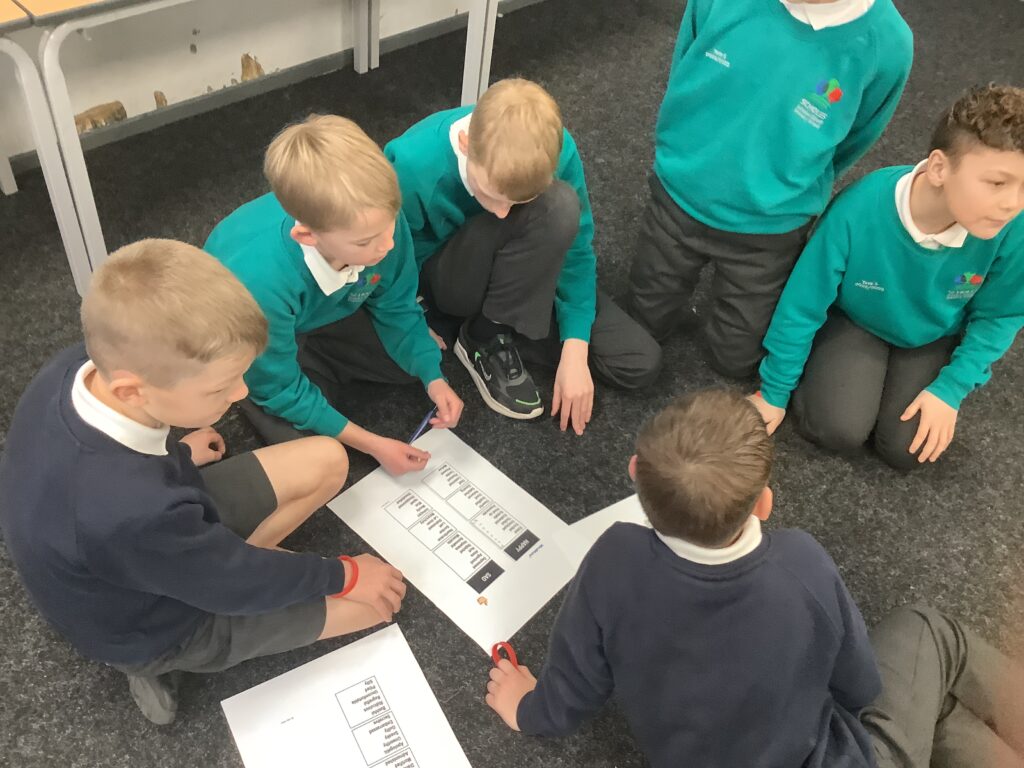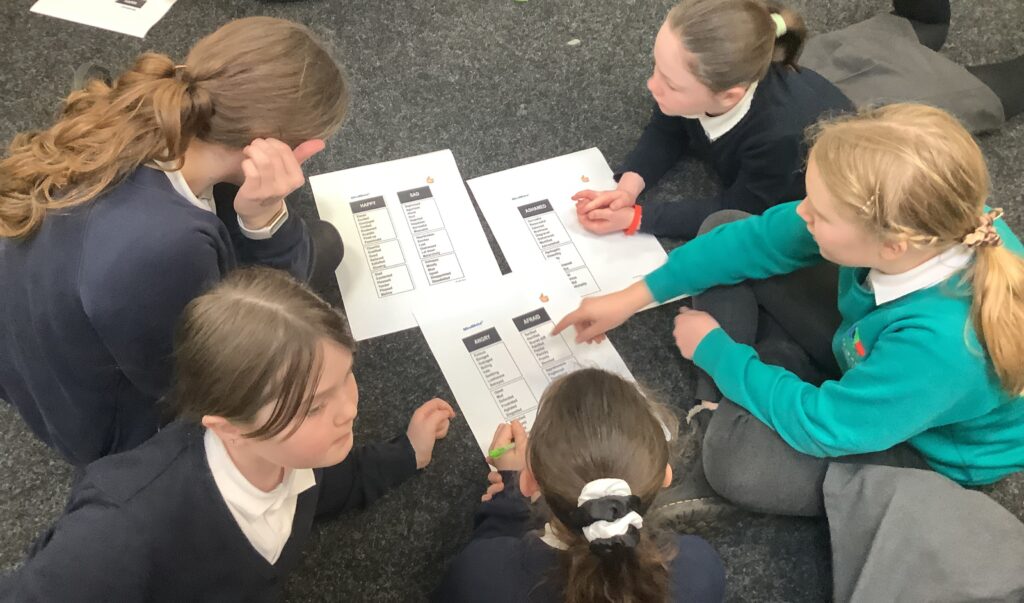Thanks to everyone who donated to our collection to raise money for Comic Relief. We raised £337.97 in total!
Author: Mr Roundtree
Class 5/6A News
Well, that was a week with a difference! The weather has been up to all sorts of mischief this week, but thankfully it hasn’t disrupted Class 5/6A’s learning. Let’s see what they have been getting up to.
In Maths, Year 5 have been exploring fractions represented as decimals, focusing in particular on tenths and hundredths. To help us make the connections, we have visualised objects or numbers being split into ten and one hundred equal parts respectively to identify the fraction, and then representing this in decimal form, via the use of a place value chart.
Topic has seen us continue our Computing learning with the microbit devices. This week we have turned our devices into a Magic 8 ball-style fortune teller, and also a counter. The pupils have worked hard in understanding the various coding block which form an algorithm and using an emulator to trial their code before downloading it onto the microbit.
Writing this week has concentrated on understanding the rules around the punctuation of direct speech. Help at home: Parents, when you read at home with your child, get them to identify examples of direct speech in their books and have them explain why they are punctuated correctly.
In Living and Learning, we have discussed the importance of friends and family and maintaining happy and healthy relationships with these individuals. We have particularly looked at ourselves and he role we play in these relationships, identifying what qualities we look for a in a friend, and why might people choose to be friends or spend time with ourselves.
Finally, a huge thank you to those pupils and parents who managed to make it into school on Friday despite the wintry conditions. Ensuring regular attendance at school will really help with your child’s development and learning.
Have a great weekend!
Mr. Robson
This week’s message (Friday 10 March 2023)
Scholes (Elmet) Primary is a happy and healthy place to learn. We want to keep getting better and better and a key part of this is to hear your views…
Scholes Primary is a lovely school. My children are very happy here. The staff are lovely and easy approachable and to talk to. It is a happy place for my children to learn.
That’s one of the comments from a recent survey of Reception parents – thank you to the 26 parents who took the time to let us know their views. We’ll spend some time now reviewing what was said and seeing if we can act on some of the points raised.
We need your help again – this time for all parents and carers to let us know about class trips.
We’re currently reviewing our curriculum plans. We’re keen to put a long-term plan in place for class trips. Class trips are a highlight for children:
- they’re a chance to get out and about, making learning more real or practical
- after the trip, children enjoy reviewing and remembering what they did
- the writing done after the trip is often really rich in terms of description
- they’re a memorable, exciting change from the typical day
The downside of trips is the expense – we’re very aware that trips aren’t cheap (often due to transport costs). We ask you to make a voluntary contribution to cover the cost, but even then, trips can be expensive for those who contribute and for school. Whilst the contributions are voluntary, we can’t go ahead with a planned trip if we don’t receive enough contributions.
We want to plan a schedule of trips from Reception to Year 6. This is to make sure we plan trips better, so we can closely match the trips with the learning that’s happening in school and to make sure that teachers are clear on our expectations (so that trips are spread out across the years).
To help us, we’d be very grateful if you spend just five minutes completing this short survey.
In the Summer term, look out for the annual survey for all parents and carers, too.
And now a change of subject…
Big Walk and Wheel
Get set… we’re taking part in Sustrans Big Walk and Wheel 2023.
We want your child to walk, scooter or cycle to school, even more so during the Big Walk and Wheel challenge which runs from 20-31 March.
The challenge is a great way to build physical activity in your child’s daily routine – so important for physical health and mental wellbeing. Active school runs also help to reduce congestion and air pollution outside the school gate. A 2021 YouGov study showed nearly half of UK children worry about air pollution near their school and that children thought active travel was the best away to bring down these pollution levels.
There are some great prizes to be won every day if enough children taking part!
Download your free family guide.
We’ll end this week’s message with another great comment from a Reception parent…
We love it and our daughter loves it – she always has a big grin on her face. After-school club a staff are also amazing.
10 March 2023
This week’s Talk Time poses a moral dilemma and links to internet safety.
Is using the internet is bad for your health?
You could start by listing reasons why you would use the internet (playing games, social media, watching videos). Are your reasons the same as other members of your family?
We suggest approaching this Talk Time with an open mind. You may already have strong views on this but it’s important to consider both sides of an argument before reaching your conclusions.
Check out these R2s to help you with your discussions at home:
- What are the health benefits of using the internet?
- Remember that mental health is crucial to being a healthy person.
- How could using the internet negatively impact on your health?
- How could this impact on your physical health?
- Is using the internet always an enjoyable experience?
- Decide which argument is the
- This might be the side with the most points to back it up.
- You might consider some points to be more important than others.
- You may not agree with people you speak to – that’s okay!
After the discussion with friends and family, what conclusion do you reach? Do others around you agree?
Snow update – we aim to open at 10.30am (exc Nursery)
We aim to open at 10.30am this morning.
Nursery is closed for the full day. This is because not enough staff can arrive safely.
Our wraparound care is also closed this morning. We hope to open this afternoon if it’s safe to do so.
This is due to the heavy snow. Staff can’t safely arrive at work on time at the moment. The forecast shows an improving picture, so we aim to open school at 10.30am.
Apologies for the inconvenience.
Science – working scientifically
This half term our science topic is working scientifically.
During this topic, we will be comparing different roads types and conducting investigations to find out what the best road surface is.
The scientist we will be finding out about is John McAdam. He invented a new way to build roads so that they were smooth, hard and allowed rain to drain away.

This week’s message (Friday 03 March 2023)
This week’s message is all about our current topic…
What do we mean by topics?
Topics are the way we teach much of the learning in the foundation subjects (eg history, art, geography, DT). Each half-term topic has a driving subject – the main focus for teaching pupils the knowledge and skills they need. The driver changes with each topic to ensure a broad and balanced curriculum.
Although the learning in each topic comes from the driving subject, there are opportunities for enrichment through other subjects.
Read more about the intent, implementation and impact of our topics.
What is this half-term’s topic?
This half-term, it’s Computing. We’ll be developing our knowledge of computers and computer programming.
Computer programming is super. Creating games, animations and solving real world problems is fun, encourages creativity and is challenging! Importantly, the skills the children will use and develop are easily transferable to other subjects and areas of life. For example, the concept of decomposition in programming is concerned with breaking down a large task into smaller chunks. This concept could be used when writing a story, solving a maths problem or tidying a particularly messy bedroom! Debugging is the skill of identifying and fixing an error in a program. It requires systematic, objective thinking and plenty of resilience.
Each phase has age-related specific knowledge, skills and vocabulary that they’ll learn, use and apply across the topic. See page 13 and 14 of the curriculum statement document.
Years 1 and 2
Children will learn about how technology is used beyond school in our homes and all around us. They’ll begin to consider what a computer is and isn’t.
In programming lessons they’ll create animations in Scratch Jr by creating and debugging algorithms. They’ll then continue to use Scratch Jr to create an interactive quizzes.
Years 3 and 4
Children will reason about what exactly makes a computer a computer. Is a games console a computer? Is a TV a computer? Is a bedside lamp a computer? Next, they’ll learn about inputs and outputs and identify different examples of them in everyday technology.
They’ll then be introduced to Scratch and will learn how they can add or change sprites and backdrops and then begin to experiment with making their sprites move. They’ll look at programs created on Scratch and use logical reasoning to explain what will happen when these programs are run. They’ll learn about the importance of sequencing in programming when they recreate a well-known melody. Finally, they’ll create their own ‘band’ on Scratch by programming different instrument sprites to play sounds.
Years 5 and 6
Children will learn about what a computer network is and that the Internet is an enormous computer network. They’ll learn about the difference between the Internet and the World Wide Web. In programming lessons, they’ll be introduced to BBC Microbits – pocket sized computers which they’ll program to do lots of different things. This will allow children to gain a deeper understanding of concepts like sequence, selection and variables. Some of this vocabulary may sound alien to you. However, before the end of the topic your child will be able to tell you what they mean and give examples of how they’ve used them in their projects. Some of the projects your children will be making are:
- a magic 8-ball style program which will give you an answer to all your questions!
- a compass so you can confidently find your way to school in foggy conditions!
- a pedometer to count the number of steps they’re making
How can you help?
Talk to your child about what they’ve been learning in class. The Class News page is a good place to find out more about what your child is doing.
The school library and local libraries have lots of books about coding and computer games which your child will be able to borrow and develop both their reading skills and computing knowledge.
Finally, try programming with your child. There are loads of programming apps and software available to download, often for free…
Key Stage 1
- Daisy the Dinosaur (Apple only)
- Beebot
- Tynker Junior
- Scratch Jr5
Key Stage 2
- Lightbot
- Tynker
- Scratch Jr
- Scratch
Finally, and importantly, talk to your child about our Being Online: Acceptable Use Agreement. (Page 8 is the one for early Years and Key Stage 1 children and page 9 is for older children). Discuss whether the points that are listed apply to being online at home as well as at school.
03 March 2023
This week’s Talk Time is linked to our current topic Computing and has a social theme. There are lots of different types of technology that we can see in the world around us. Take a look at the photos below. What can you see? Have you used any of these things before? Have you seen other people using these things? What other types of technology do you use at school or at home?

This week we’d like you to set yourself a challenge and see how long you can go without using technology.
Can you think of some different ways to approach tasks that would usually involve using technology? For example, using the stairs instead of an escalator or lift. Or playing a board game or reading a book instead of playing on your games console, mobile phone or watching television.
World Book Day
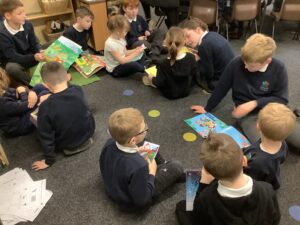



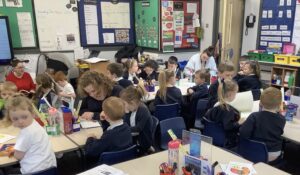
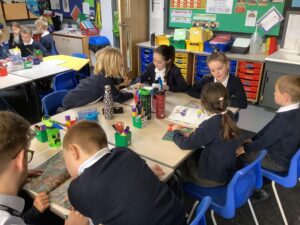
One of the ways we have celebrated World Book Day is by shared reading. The year 5/6 children visited KS1 this morning to read our favourite books to us. The children enjoyed being read to and sharing why they liked their books.
The adults have also been sharing their favouirte books with the children.
Class 5/6A News
A big welcome back to all of our pupils following the half-term break. I hope you are all relaxed and refreshed and ready for the new half-term. Already a jam packed week of learning is behind us. Let’s catch up with what Class 5/6A have been up to.
In Maths we are revisiting fractions, looking at multiplying an integer by a unit and non-unit fraction. Using our existing fractions and times table knowledge, our Year 5 pupils have made an excellent start to the half-term. How to help: continue to support your child’s maths learning at home by encouraging daily use of Times Table Rockstars.

In Writing, we are working towards writing a spooky narrative and setting description. This week we have watched an animation of Whitby Abbey to help us generate some vocabulary which we can use in our piece. We have also brainstormed figurative language to describe a number of spooky scenes such as darkened forests, lightning and moonlight skies. Our pupils have come up with some excellent description, and I can’t wait to see the pieces they produced.
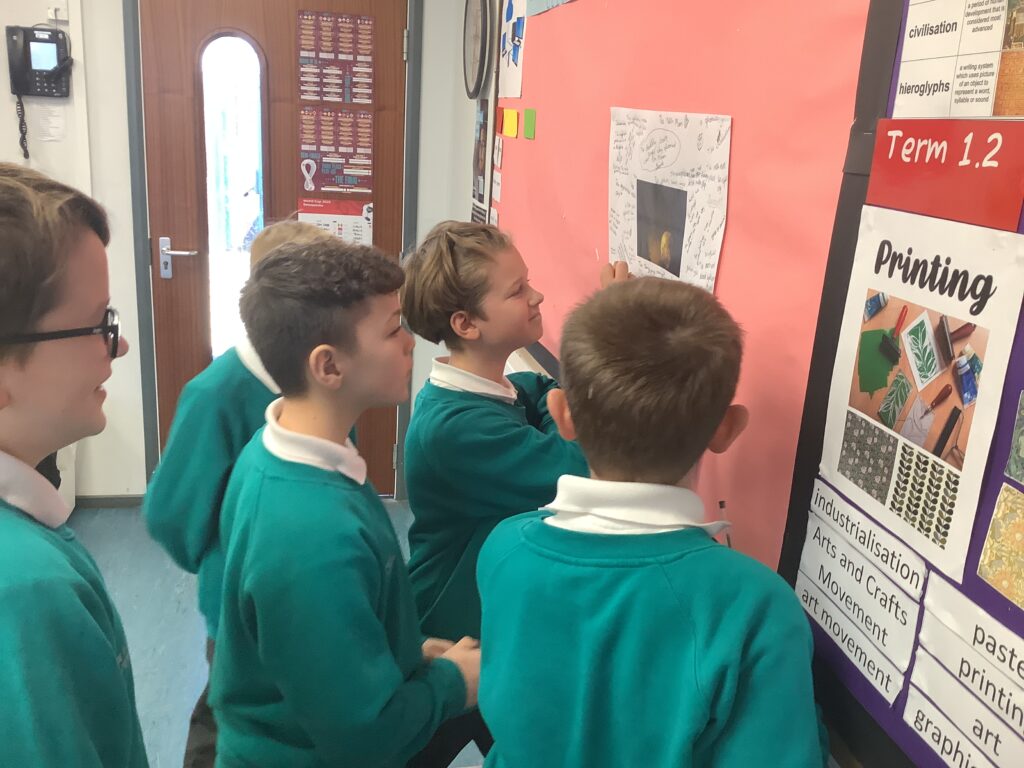


The spooky theme has also appeared in our Reading work. We have been reading passages from Bram Stoker’s ‘Dracula’ and using descriptive language from them to recreate drawings of the lead character and his surroundings.
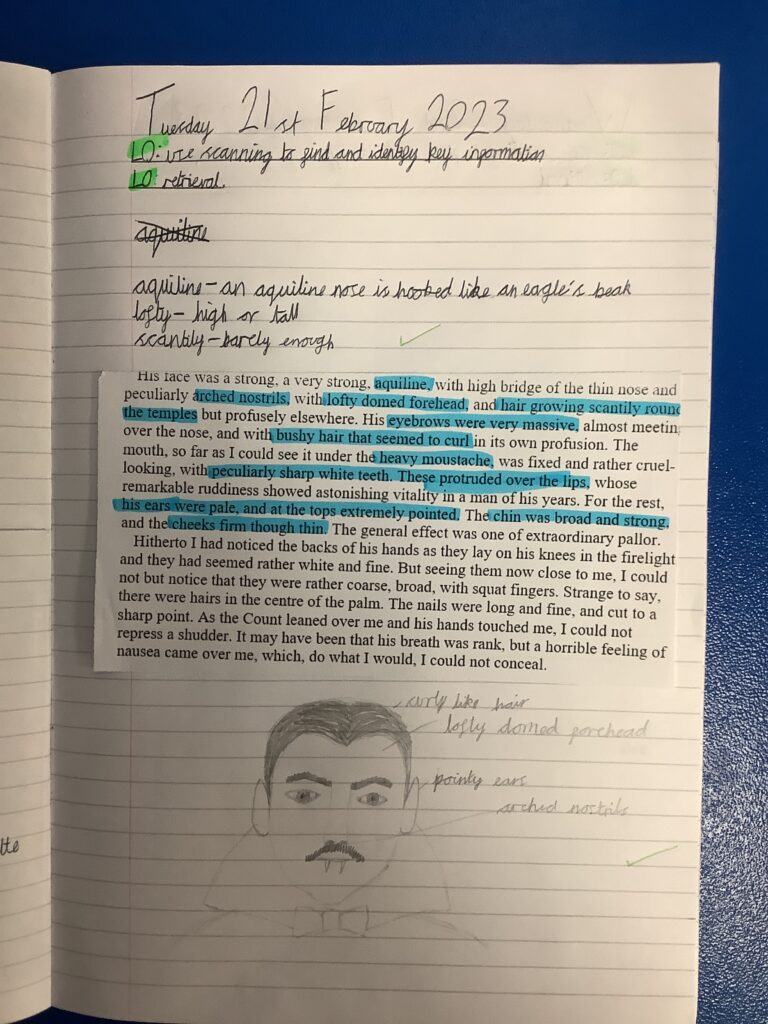
Also in Reading we have our Friday Book Club. This half-term pupils have been given a selection of texts to choose from, which they can take home to read alongside their classmates. On Fridays we will get together to share our thoughts on what we have read so far, identify similarities between texts, and share our opinions.

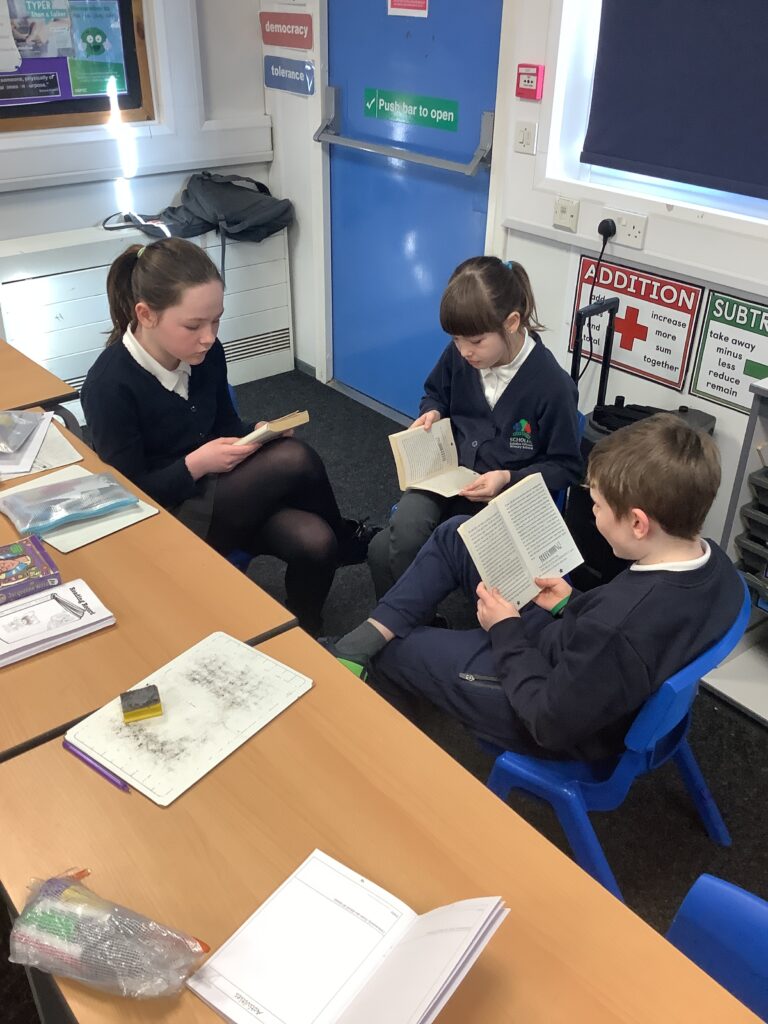

We are Chemists this half-term in Science. Our work this week has seen us mixing bicarbonate of soda with vinegar and using balloons to test how much carbon dioxide can be created to inflate a balloon. Once a test experiment had been established, pupils then changed some of the variables of the experiment to see how this would affect the outcome.



Being able to recognise both positive and negative feelings and understand how to deal with them has been focus in Living and Learning. Our circle time discussion has seen us look at a wider range of vocabulary to describe feelings we experience every day, how we can express these, and what to do if we experience a feeling we are not sure of. Pupils discussed how they would support a peer who was struggling to deal with a particular scenario, and turn it into a positive.
